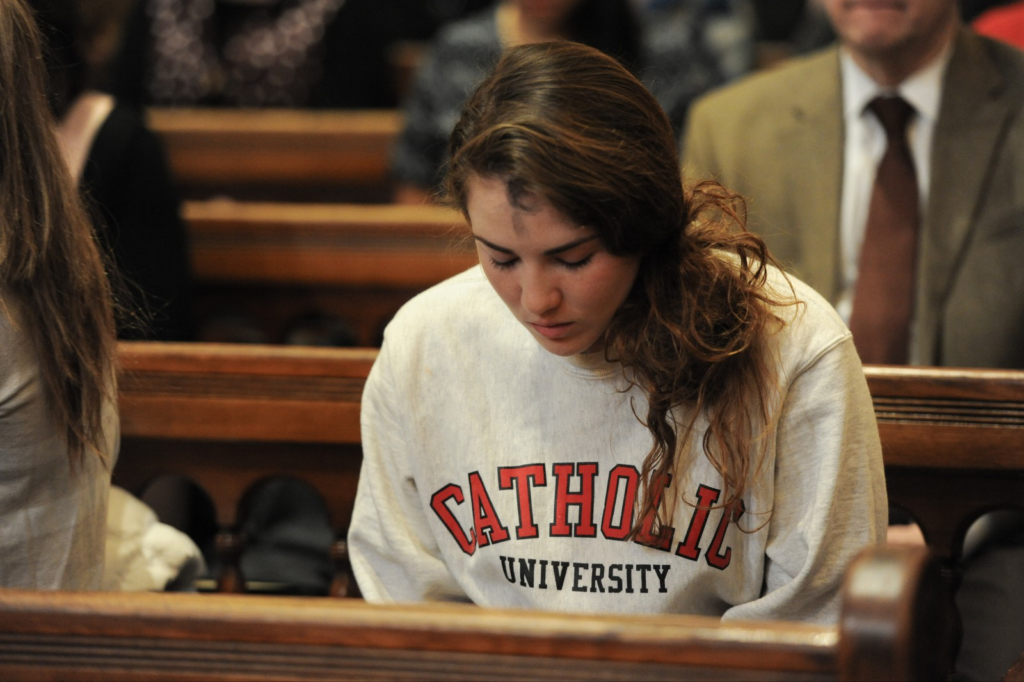Ash Wednesday: Approaching Fasting in a New Light

Image Courtesy of Catholic University Campus Ministry
By Anna Harvey
*Trigger Warning: Topics within this article include eating disorders*
With Ash Wednesday just a few days away, many of us still have yet to prepare for Lent. In addition, many of us are looking forward to the day of fasting on Ash Wednesday and Good Friday to kick-start Lent.
However, for some of us, Ash Wednesday and Good Friday present certain challenges, particularly with how we approach food.
One topic that many Catholics do not consider while preparing for Ash Wednesday is the impact of fasting upon Catholics who are recovering from eating disorders (EDs) or have a history of eating disorders. Natalie Bauman, a junior social work major, gave some insight on how Catholics should approach this issue.
“Unfortunately, for some Catholics who have EDs, fasting and the way it is sometimes taught incorrectly has actually contributed to the development of the disorder itself,” Bauman said.
Likewise, a student who wished to remain anonymous noted that in their case, fasting presented a difficulty while struggling with an ED and made it difficult to break that mindset.
“In my case, fasting throughout the day contributed to the mindset I already had to restrict my food intake. Looking back, I realize that instead of approaching fasting with a spiritual mindset, I approached it with the mindset of my ED,” the student said.
Bauman notes that while it is important to follow Church teaching, Catholics who suffer from EDs ought to follow a specific treatment plan and find an alternative to fasting. For Catholics with EDs, talking with a priest over an appropriate alternative can be a way to help.
Similarly, the aforementioned anonymous student said that it was a discussion with a priest that helped them start on the road to recovery.
“When I went to confession, I didn’t have the intention to talk about what I had been experiencing, but then something moved me to explain what I was going through and to ask for help. I was very close with our parochial vicar at the time, and I felt comfortable explaining the situation to him; he was extremely understanding and encouraged me to find resources that would help me. I had just gotten to the point where my ED was keeping me from God,” the student said.
Bauman notes that treatment and therapy in itself is already a huge sacrifice for Catholics with EDs, so an alternative may not only be the healthier option, but also the holier option.
“Another option is to pick a sacrifice that isn’t related to food, like doing a kind deed or giving up their favorite TV show, etc,”Bauman said.
While we may not immediately notice, there are many Catholics around us who are recovering from EDs or those who have a history of EDs. Bauman reminds us that for individuals with EDs, fasting is something very personal, and is between the individual, their spiritual director, their doctor, and God. Bauman explains what many of us can do for our sisters and brothers who struggle with EDs.
“As Catholics we are called to humility, and our sacrifice isn’t meant to be loud. If you see someone who isn’t fasting, there is probably a very good reason why that really doesn’t need to be questioned! Simply pray for those people so that they may also have a fruitful Lent. This time is difficult for those with EDs, and reserving judgement is the least we can all do to support our brothers and sisters in Christ,” Bauman said.
As a Church, we are supposed to help encourage one another to grow closer to Christ, and this also includes being a supportive influence to one another. Even if we do not know someone in our immediate circle who has an eating disorder, we still encounter many others in our daily lives who may be struggling with similar issues. Consequently, it is so important to exhibit kindness and understanding to all we meet; each person is on a journey, and it is important to respect that journey and to be a loving witness of Christ to all we encounter, especially during this Lenten season.
If you or anyone else you know struggles with an eating disorder, you are not alone! The university’s Counseling Center is well-equipped to help you find the treatment plan that best suits you. Call 202-319-5765 to make an appointment with a counselor today.





